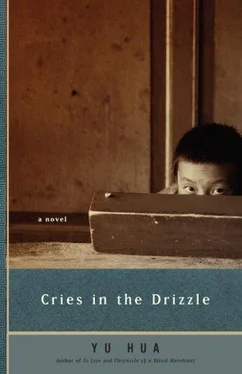I cannot remember now who came up with this name. But I'll never forget the time when Guoqing, then a second grader, ran into the classroom with a droll expression on his face. He tapped loudly on the dais with the blackboard eraser and solemnly announced that the teacher would be a little delayed, because “The Imperial Army is back …”
Guoqing was a real daredevil on that occasion, for he had the impudence to go on: “… escorted by the Chinese collaborator.”
Guoqing had to pay for being a smart aleck. There must have been at least twenty classmates who reported him at the same time. When our teacher took his place on the dais, his face was livid, and Guoqing was so frightened he was sweating mightily. I too had my heart in my mouth, not knowing how the teacher would punish him; even the classmates who had ratted on Guoqing now felt uneasy. Given our age at the time we quailed at the prospect of punishment, even if it was inflicted on children other than ourselves.
This angry expression stayed on the teacher's face for a good minute, and then suddenly he was all smiles. There was something eerie about the way his manner changed. In a velvety tone he said to Guoqing, “I'm going to punish you.” Then, turning to the rest of us, he said, “Now we'll start the lesson.”
Throughout the whole period Guoqing's face was pale as he awaited with foreboding and a kind of perverse longing the teacher's retribution. But when class was over the teacher picked up his notes and left the room without even looking at him. I don't know how Guoqing managed to get through the day. He remained glued to his seat, watching us timidly like a new kid in class. He was no longer the same boy who loved to race around in the playground, but more like a skittish kitten. Several times his mouth twisted unnaturally as though he were about to burst into tears. Only when school finished for the day and he was completely outside the school gate did he dash about like a panther kept too long in captivity. We now felt that nothing was going to happen after all and confidently assured him that the teacher must have forgotten about it. Besides, the Imperial Army was still here, and the teacher was bound to have a smile on his face again tonight.
But when school began the following morning the first thing that the teacher did was to tell Guoqing to stand up. Then he asked him, “How do you think I should punish you?”
Guoqing had forgotten all about it, and his whole body trembled. He looked at the teacher fearfully and shook his head.
“You can sit down now,” the teacher said, “and think it over.”
When the teacher said to think it over, he was really telling him to not forget to torture himself. For Guoqing the next month was sheer hell. If he ever forgot about the punishment and looked his cheerful old self, the teacher would appear out of nowhere and quietly remind him, “I have yet to punish you.”
This threatened but never-imposed sentence left Guoqing on tenterhooks every day. All it took was for the poor boy to hear the teacher s voice and he would quiver like leaves in a wind. Only when he went home after school did he feel more or less secure, but the feeling of apprehension would return on his way to class the next day. This life of anxiety did not really end until his father abandoned him, when it was superseded by far greater misery.
At that point, out of compassion perhaps, the teacher not only discontinued his intimidation of Guoqing but actually went out of his way to commend his achievements. Guoqing would get a perfect score for an essay even if he had written a couple of characters wrong, whereas I would get only ninety points for an essay with no mistakes at all. During the days before Guoqing's uncles and aunts arrived our teacher took him to see his father. In his kindly tone the teacher sang Guoqing's praises: such a respectful, intelligent boy, he reiterated — why, he was a favorite with every teacher in the school. After listening to these words, Guoqing's father said coldly, “If you're so fond of him, maybe you should adopt him as your own son.”
Our teacher had an answer to that. Smiling broadly, he said, “Actually, I was thinking of adopting him as my grandson.”
Until I myself was earmarked for punishment, I held our teacher in warm regard. When I went to school that very first time with Wang Liqiang, I was taken aback by the sight of him knitting, for I had never seen a man with a ball of wool in his hands. Only when Wang Liqiang brought me before him and told me to greet him as Teacher Zhang did I realize that this odd character was going to be my teacher. He seemed affable and considerate. I remember he put his hand on my shoulder and said something that I took as a compliment: “I'll make sure that you get a nice seat.”
He was as good as his word, assigning me a place in the middle of the front row. Apart from times when he needed to go to the back of the dais to write on the blackboard, the rest of the class period he was standing right in front of me. He would lay his notes down, rest both hands on my desk, and lecture away, ejecting saliva with the force of his delivery. As I listened, my upraised face was fully exposed to his spit, as though I was taking notes in a drizzle. When he noticed that my face was flecked with saliva, he would stretch out a chalky hand to wipe it away, and by the end of class my face was often stained in gaudy colors, like a cotton print.
The first time I was punished by him it was about halfway through third grade. A big snowfall that winter gave us schoolchildren an opportunity to engage in a wild exchange of snowballs in the playground. Woe befell me when one of my snowballs, aimed at Liu Xiaoqing, accidentally hit the head of a girl classmate, whose name I no longer remember. This girl wailed as loud as if I had made her an indecent proposal. She complained to the teacher.
He called me up from my seat, where I had just sat down, and told me to go outside and make a snowball. I thought he was mocking me and just stood there, not daring to move. He continued to teach the class, seemingly having forgotten about me, and it was a few moments before he said to me in surprise, “Why are you still here?”
I left the classroom and went to make a snowball. When I returned to the classroom, the teacher was reading aloud a story from the textbook about the selfless courage of Ouyang Hai. It was a spirited recitation, sweeping high and dipping low like a road through the mountains, and I stood by the door, not daring to interrupt. At last he finished reading a long section of the story and walked toward the blackboard, but to my dismay he still did not pay me the slightest attention. It was disconcerting to find that he had forgotten about me, and as he wrote on the board I said to him timidly, “Sir, I made the snowball.”
He shot me a glance and gave a grunt of acknowledgment, then continued to write. Finally he tossed the chalk into the box and turned to the girl. He told her to check to see if the snowball in my hand was as big as the one that had hit her. She, of course, had never seen the snowball, because it hit her on the back of the head and immediately disintegrated. Though some time had passed since she had been upset by the incident, she began to cry pitifully as soon as she arrived next to me, saying, “It was bigger than this one.”
So I was ordered out of the classroom by the teacher once more, to make a bigger snowball. When I came in holding a jumbo-size snowball in my hands, he did not ask the girl to once again certify that it had the correct dimensions. He walked around the classroom a couple of times and formally announced my punishment: I was to stand there and could not return to my seat until the snowball had melted.
That winter morning a north wind howled through the broken windows of the classroom while the teacher, his hands in his sleeves, recounted in the cold the story of heroic Ouyang Hai. I stood by the door, clutching my icy snowball. Gradually I felt a peculiar scorching sensation in my hands, as painful as if they were being sawn off. But I had to be careful not to let the snowball fall from my grasp.
Читать дальше












